Robert Gordon Mixes Politics & Music (Interview)
A couple of weeks ago The 13th Floor’s Marty Duda spoke with Morgan Neville, one of two directors of Best Of Enemies, the documentary screening at this year’s New Zealand International Film Festival based around the 1968 televised debates between William F Buckley and Gore Vidal. Now, as the Film Festival gets underway, Marty speaks to the other half of the team, director Robert Gordon. Both an author and a filmmaker, Gordon is best known for his musical work including his books, It Came From Memphis and Respect Yourself: Stax Records and The Soul Explosion. Gordon and Neville have worked together before, including the film Muddy Waters: Can’t Be Satisfied. In this interview, Robert Gordon discusses how he and Morgan Neville collaborate and weighs in on what he think makes a good music documentary.
Click here to listen to the interview with Robert Gordon:
Or read a transcription of the interview here:
MD: I spoke to your co – director Morgan Neville a few weeks ago so I will get your side of things. I guess the first thing that I’m interested in is, how did the two of you came about the idea of making this film? Did one of you bring the subject matter to the other or did it come from outside? How did it come about?
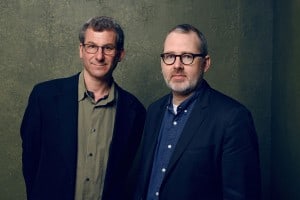
RG: Yeah, a friend of mine had acquired a bootleg DVD of the raw debates and when I saw it I was really compelled. When I saw it I was really struck by how the culture wars of today were expressed in the confrontations between these two guys and I knew I wanted to make a film about it. I’d made four other films with Morgan so I brought this over to him and he saw it all the way I saw it and we set out, that was in 2010.
MD: Right, now from what I understand Morgan actually worked with Gore Vidal, did you know that at the time?
RG: I did not at the time.
MD: That must have been a gold mine right there to find out that.
RG: Well, I guess he told you the worst job he ever had.
MD: Yes he did.
RG: Really what the gold mine was, was when we went out and did our first round of interviews because when you’re starting a film, you know you’re never all the way sure an idea is there and it was an affirmation for me that Morgan got excited by it. When we went out and did this first round of interviews, which included Christopher Hitchens and Frank Rich, among others, and these guys read everything into the exchanges that we were reading into it. They read that and more. It just told us, great! This will work, we can throw ourselves into it.
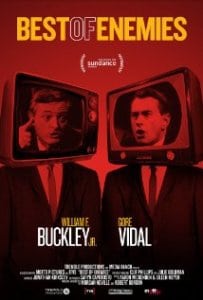 MD: For folks who may not be aware of who William F Buckley and Gore Vidal were and what they represented back then, how would you describe what it is that got these folks like Christopher Hitchens excited about viewing these debates?
MD: For folks who may not be aware of who William F Buckley and Gore Vidal were and what they represented back then, how would you describe what it is that got these folks like Christopher Hitchens excited about viewing these debates?
RG: Well, Buckley was responsible for creating the modern conservative movement, he kicked out the racist kooks, the anti-Semites and brought a philosophy to conservatism that people could stand behind with pride. In other words they weren’t going to be embarrassed to be called kooks and the apogee of his work I think is the the election of Ronald Regan in 1980. And Vidal was less of a torch bearer for a party, he was more an independent thinker who’s ideas were really to the radical left. The things he was advocating are only coming about today, gay marriage, legalization of marijuana, these things were blasphemy when he was saying them. So these two guys were visionaries for polar opposite positions.
MD: what do you reckon William. F. Buckley would think of Donald Trump today?
RG: (chuckles) I think Buckley would be saddened because what he was after… I think he’s be saddened by the Tea Party as well. That’s the kind of thing he was getting rid of. He was cleaning out the movement to create a respectable party. I guess it depends on your political beliefs after that to say whether he was successful or not but there was a period for much of Bill’s life when you could be a respectable Republican and I think that the Tea Party has made that harder in the same way that John Birch Society made it hard when Bill began his movement.
MD: I guess watching the two of them face off against each other there is definitely, you want to compare the political discourse of the mid 1960’s with how it is today. How would you describe how things have changed or have stayed the same as far as right versus left?
RG: Well, I think today…there are two ways of answering that… you know we can talk about how it’s done on TV. And when we talk about how it’s done on TV we basically have, we’ve gone from broadcasting with three networks to narrow casting with a thousand networks. And so people tune into Fox, people who want to have a right to far right opinion can tune into Fox, can hear people fan the flames of their fears and I think that that’s an audience who are looking to have that adrenalin, that fear induced adrenalin running through their veins.
So much of the political dialogue on TV now is lacking in actual content and certainly lacking in an exchange.
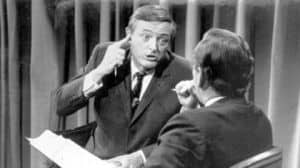 What we see with Vidal and.Buckley is they understood that they were addressing the entire nation both left and right. They understood that there was a chance they could change viewers’ opinions and when we watch now sort of you are watching because you know what they are going to say. You are watching to have your fears affirmed.
What we see with Vidal and.Buckley is they understood that they were addressing the entire nation both left and right. They understood that there was a chance they could change viewers’ opinions and when we watch now sort of you are watching because you know what they are going to say. You are watching to have your fears affirmed.
MD: Confirmation of what they already believe in, watching somebody repeating them back to you to make you feel better about yourself. Which doesn’t really help.
RG: Exactly.
MD: Getting back to the actual making of the film. How did the two of you divvy up what you would do in order to get the thing made? Who took on what roles?
RG: Our formula is basically, co-produce, co-direct, commiserate.
In other words we can both go off on shoots independently. We did many shoots together. With the magic of the internet, I could be involved in the editing even though I was several thousands miles away. I was working in real time with the editor for much of the movie and then I would be in LA for two weeks at a time. Morgan was working on another movie at the same time and he might be away so I would be there when he was gone so there would always be one of us on site. That was cool because when each of us was there we were looking to put our own fingerprints on the film and that creates dialogue between him and I, because he sees what I do and says I liked it the other way or that’s good that opens up this possibility, so it’s good. A movie is a collaborative process…you can’t do it by yourself. I think the idea it seems much easier to me to co-create a movie than it is to co-create a book.
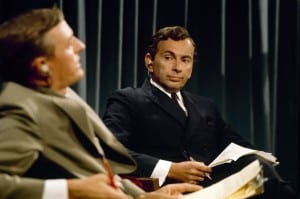 MD: That was going to be my next question, comparing the writing of the books that you’ve done to making the documentaries that you have and if you have to change your way of working.
MD: That was going to be my next question, comparing the writing of the books that you’ve done to making the documentaries that you have and if you have to change your way of working.
RG: Yeah, a book requires solitude, that intense time to take the thoughts from your head on to an extended piece of paper in an organised way. You can’t really be chatting with someone else while you’re doing it. I love writing a book and every time I finish one I look back and I think Oh my God, I’ve been in a fever for 10 months or however long it’s taken and you’re not aware of it, you’re only aware of it when you look back. But a movie, you’re going around, when you shoot it you have the camera operators there, there are lights, you carry the footage back to the editor. The editor has questions for you, you have a question for your partner, it’s just a much different experience. When you read a book, you read a book alone. When you watch a movie, you can watch it in a group. Everything about the two is very different I’ve got to say.
MD: One very internal one very kind of outgoing I guess. Morgan mentioned you kind of concentrated on the debates themselves, did you have a lot to do with finding the archival footage and getting into the nuts and bolts of that?
RG: Yes, I was really struck by their ideas and by the way they went back and forth. I kind of obsessively watched the debates when I first got them. Once we actually got into the editing of the film I was much more steeped in those. We had done the first four years of editing in Memphis and all that was very early and preliminary. We weren’t funded we were just doing what we could and then we actually moved the production to L.A. and worked out of Morgan’s office so when archival footage would arrived, he could see these sort of colour supplementary material more readily and easily than I could so he quickly became more steeped in that. We both had input into both sides but that was sort of an accidental way that some duties got divided.
MD: A lot of folks will know you from your music related books and films. Are you working on anything currently music related?
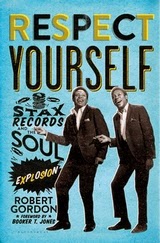 RG: Well, I believe that I am negotiating a deal for the rights to my Stax Records book, Respect Yourself. There is talk of making a limited run TV series out of it. That’s been cooking and I’ve been thinking you know, I’ve never made a scripted feature so I’ve got a script and I’m thinking of polishing that off and maybe venturing into that world. It would be something new and I’m in my mid 50’s and I like the idea of doing something new.
RG: Well, I believe that I am negotiating a deal for the rights to my Stax Records book, Respect Yourself. There is talk of making a limited run TV series out of it. That’s been cooking and I’ve been thinking you know, I’ve never made a scripted feature so I’ve got a script and I’m thinking of polishing that off and maybe venturing into that world. It would be something new and I’m in my mid 50’s and I like the idea of doing something new.
MD: There’s quite a few others there at the film festival in which Best of Enemies is being shown as well as music related documentaries, Wrecking Crew and the Amy Winehouse film and lately there’s been the Nina Simone documentary come out…do you pay a lot of attention to these? Do you have an opinion on what makes a good music documentary?
RG: Well yes, of course. It’s much easier to see, to determine, what makes a bad one. But I haven’t seen The Wrecking Crew in a long time. I saw bits and pieces of it long ago, that film’s been around a while.
I have seen the Nina Simone and the Amy Winehouse recently and what I really liked about Amy Winehouse piece was the intimacy of the interviews and you only hear them you don’t see them and just the very tone of the voices. I was interested to find out, what his actual set up was.
Actually, there’s another music documentary that will probably end being the thing that gets funded next and I’ll end up doing it. I don’t want to, since we haven’t secured the deal, name the band. That sort of intimacy seemed appropriate like a really great way to pick up this next project I’m hoping to do. Nina Simone I thought was really interesting. With both of them they had so much archival footage, it’s always a great thing. I like in the Nina Simone film how the songs were given a lot of space. I’ve made films where we have given some songs a lot of space and where we have had to trim some pretty tight and you can justify those trims but it’s always great when you can let the music play. And I like seeing a music film where the music is an integral part, where the songs propel the movie and where they’re not just inserted as interludes.
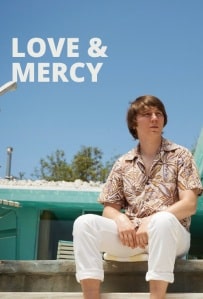 MD: You mentioned scripted film, have you seen Love and Mercy,the Brian Wilson film?
MD: You mentioned scripted film, have you seen Love and Mercy,the Brian Wilson film?
RG: It’s so funny because I’m really bad at going to movies but you’re batting almost a thousand. I’ve seen Love And Mercy.
MD: I just managed to see it last night that’s why I bring it up.
RG: I was taken by it in a way I wasn’t expected to be. I’m not a huge Beach Boys fan.
MD: I’m with you on that one I think the whole Pet Sounds is the greatest album is ever made is over rated.
RG: I do too, I find their stuff a little too clean for me. I like something with more grit. But what I liked in Love and Mercy is the way we rode the madness with Brian. I felt like there was a real intimacy to it and consequently we felt it and I thought it was a very emotionally powerful film and it was beautiful to look at too.
MHD I loved seeing the re creations of Pet Sounds, the studio segments. It was fascinating stuff. Also there is quite a correlation between seeing Brian Wilson and Amy Winehouse and the fact they just didn’t have people taking care of them that should have been around them nurturing them instead of taking advantage of them.
RG: Yeah, you certainly saw that in the Amy Winehouse piece in a really abusive way, it was ugly. I’m not afraid to admit it, I don’t know her stuff that well. When I saw her singing that jazz stuff in beginning I was shocked.
MD: I think most people are.
RG: I want to go back and listen to her later stuff and hear the jazzy roots and see if I can hear them. It’s great when a film can leave you with things you want to explore. I like that and I think the Amy film did that and I hope Best of Enemies does that.
Click here to listen to, or read, The 13th Floor interview with Morgan Neville.
Click here for more info about Best Of Enemies screening at the NZIFF.
- Civil War – Dir: Alex Garland (Film Review) - April 9, 2024
- Pearl Jam – Dark Matter (Monkeywrench/Republic) Album Review - April 1, 2024
- Blonde Redhead – New Zealand Tour 2024 - March 14, 2024
